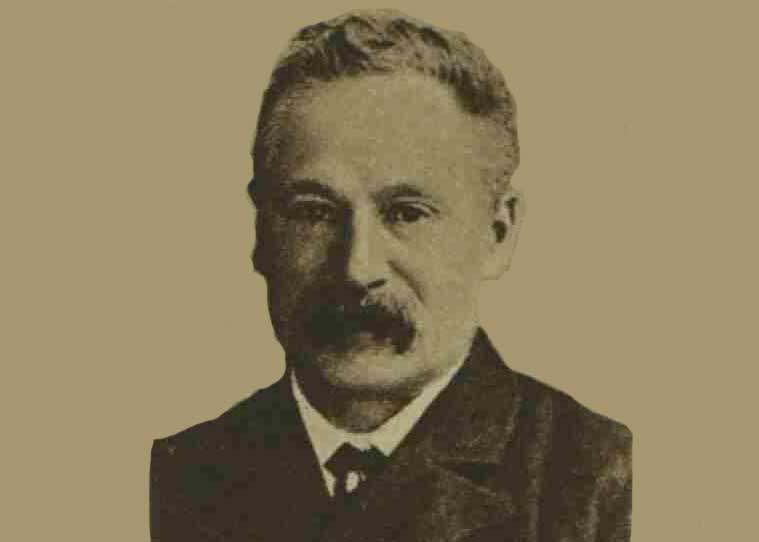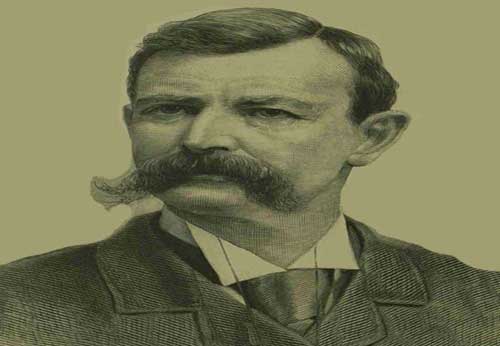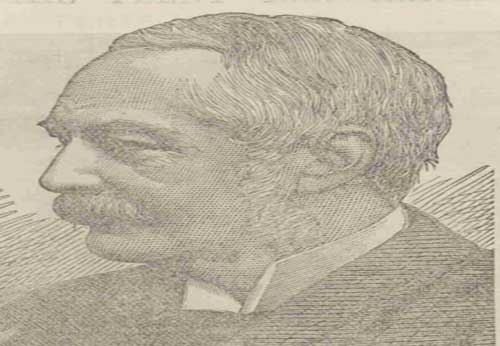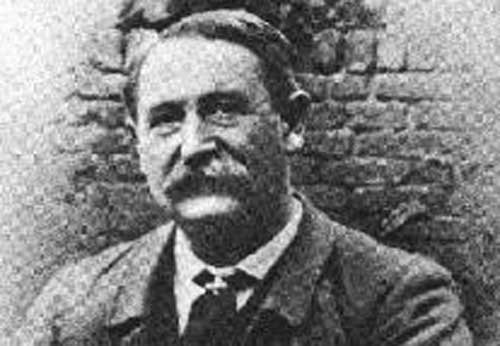- As the local Coroner, Wynne Edwin Baxter presided over the inquests into the deaths of Several of Jack the Ripper's victims..
- A lawyer by vocation, he was appointed Coroner for Whitechapel and Spitalfields in 1887.
- At the inquest into Annie Chapman's death he created a sensation when he announced that the murders may have been committed in order to obtain body parts.
- He remained a Coroner until his death in 1920.
- Site Author and Publisher Richard Jones
- Richard Jones
WYNNE EDWIN BAXTER

THE CORONER AT THE INQUESTS
Wynne Edwin Baxter (1844 - 1920) was the Coroner whose name has become synonymous with the inquests into the deaths of the victims of Jack the Ripper and the Whitechapel murders.
As the Coroner for South-East Middlesex, he presided over the inquests into the deaths of three ripper victims - Mary Ann Nichols, Annie Chapman, and Elizabeth Stride - and three Whitechapel murders victims - Rose Mylett, Alice McKenzie and Frances Coles.
He also conducted the inquest into the death of Joseph Merrick (1862 - 1890), "The Elephant Man."
A DREADFUL RACE
In January, 1890, Baxter gave an intriguing interview, in which he spoke of some of the problems he encountered whilst performing his duties as Coroner.
The interview was reproduced by several newspapers, the following version coming from The Eastbourne Gazette, and published on Wednesday, 22nd January, 1890:-
...Mr. Wynne Baxter (coroner) who holds thirty inquests a week in the East End, gives a harrowing account of the physical degeneracy and the awful poverty prevailing there.
He says:-
One of the difficulties of the East-end coroner is the jury. They are not paid, and they should be paid, for they are mostly recruited from the working classes claims, and of course they lose a day's work and a day's pay.
Owing to the peculiarity of my division, my cases on the Surrey side of the river get a shilling a head. In the Kentish and Middlesex sections the jurymen receive nothing.
You will readily understand they don't like that.
Many of them are grossly ignorant, and they generally ask me for beer when they sign the depositions. Some cry out when the officer produces the bible that they don't believe in that book. Others declare that they are anarchists.
As for the witnesses that appear before me, they are terrible. Many cannot write or read; many do not even know the name of the street they live in; and often I cannot understand the language they speak.
The children of the East-end are a dreadful race.
You can imagine why; when the bread-winners leave their room they have two alternatives - the children may be turned out into the streets to play, in which case they are often run over, or they may be locked in, in which case they may be burnt. Burnings and runnings-ove are common cases with me."
A SAD CASE
As for Baxter's opinions on some of the cases that came before him, he was, as can be seen from the following article that appeared in The Lincolnshire Echo, on Friday, 2nd April, 1909, more than willing to opine on some of the people he encountered in his professional capacity:-
Mr Wynne Baxter, held an inquest on Thursday, at the London Hospital, into the circumstances attending the death of Dr. Angus Bewley Wilson, a house surgeon at the hospital, who was bitten on the thumb by a patient and died from blood poisoning.
A woman who was suffering from laudanum poisoning was being gagged in order that the stomach pump might be used when she bit the doctor's thumb.
The Coroner said the doctor had lost his life owing to a woman whose life was certainly not worth it from the public point of view, she having attempted suicide on more than one occasion.
"The daughter of the shoemaker goes badly shod", and it may be that the doctor did not pay so much attention to his own wound as he would have done to other people.
It was another life sacrificed in the interests of other people. One heard talk of doctors and their fees, but there was another side to the question. There was no doubt that there was a great deal of generous conduct on the part of doctors and considerable sacrifice also.
The jury returned a verdict of death by misadventure."
ABOUT TO RETIRE
In July, 1920, many newspapers reported that, after forty years as Coroner, in which time he had conducted more than 30,000 inquests, Wynne Baxter had decided to call it a day and had announced his retirement.
However, as it transpired, the rumours of his impending retirement were unfounded, and East London Observer, having interviewed Mr. Baxter, published the following correction to the story on Saturday, 14th August, 1920:-
The report of the retirement of Mr. Wynne E. Baxter, the Coroner for East London, who lives in one of the picturesque houses of the Queen Anne period in Church Street, Stoke Newington. has proved to be "merely a rumour."
"Why should I retire?", he remarked, when statement was brought to his notice. "Coroners do not get pensions, you know!"
Some idea of the work of a Coroner - a none too cheerful profession, by the way - will be obtained from the fact that in one year Mr. Baxter conducted as many as 2,500 inquests. About a dozen "Jack the Ripper" cases came under his inrisdiction.
When he was elected Coroner for Sussex, in 1870, it is interesting to recall that the coroner's officers were the local beadles of whom he had about 35 in his various districts, and inquests were held in public-houses.
By dint of much complaining, however, he managed to get a change of venue.
On one occasion at Shoreditch, when he conducted inquests on twenty-two victims of a theatre fire, he was actually given the use of a hall as a special concession.
The most sensational case investigated by Mr. Baxter was that relating to the murder in Holcombe tunnel of Mr. Isaac Gold by Lefroy, upon whose body he subsequently held an inquest, after he had ad been hanged for his crime in Lewes Gaol."
SUDDENLY TAKEN ILL
Then, on Wednesday, 15th September, 1920, having presided over three inquests at Poplar, Wynne Edwin Baxter collapsed from a heart attack.
A doctor, who was present at the court, was called to see him in his private room and deemed that he was too unwell to continue with his long list of inquests scheduled for that day.
Baxter was immediately taken to his home in Stoke Newington.
However, by the next day he had rallied, and the Pall Mall gazette reported that "Mr. Wynne Baxter, the East London Coroner, who was taken ill yesterday during a sitting of his court, was reported to be much better this morning."
Although over the next few days, the newspapers were daily reporting that his condition was improving, his recovery was short-lived, and, on Friday, 1st October, 1920, Wynne Edwin Baxter died.
A FAMOUS CORONER
Remembering him, following his death, the Nottingham Journal had this to say, in its edition of Saturday, 2nd October, 1920:-
To very few men, I imagine, can it have fallen to have had so intimate an acquaintance with crime as was the case with Mr. Wynne Baxter, the coroner for East London, who died this morning.
One of his earliest experiences in that direction was when, as coroner for Sussex, he had to inquire into the circumstances of the murder of Mr. Gould in a railway train.
The Lefroy murder was the leading sensation of the day.
When he came to London Mr. Baxter had to deal with all the "Jack the Ripper" crimes, as well as many other mysterious deaths.
During the war he held inquests on the many victims of the air raids in the East End, as well as on the people killed by the Silvertown explosion.
Mr. Baxter was a man of great culture, a leading authority on Milton, on fossil deposits, and seaweed, and on the Doomsday Book."
Article Sources
The Eastbourne Gazette. 22nd January, 1890.
The Lincolnshire Echo. 2nd April, 1909.
The Pall Mall Gazette. 15th September, 1920.
The Pall Mall Gazette. 1st October, 1920.
The Nottingham Journal. 2nd October, 1920.
Adam Wood, Inquest, London: The Life and Career of Wynne Edwin Baxter Ripperologist September 2005.
Paul Begg, Martin Fido and Keith Skinner. The Jack the Ripper A to Z. Headline Book Publishing Plc. (1992).
Richard Jones. Uncovering Jack The Ripper's London. New Holland Publishing (2007).





